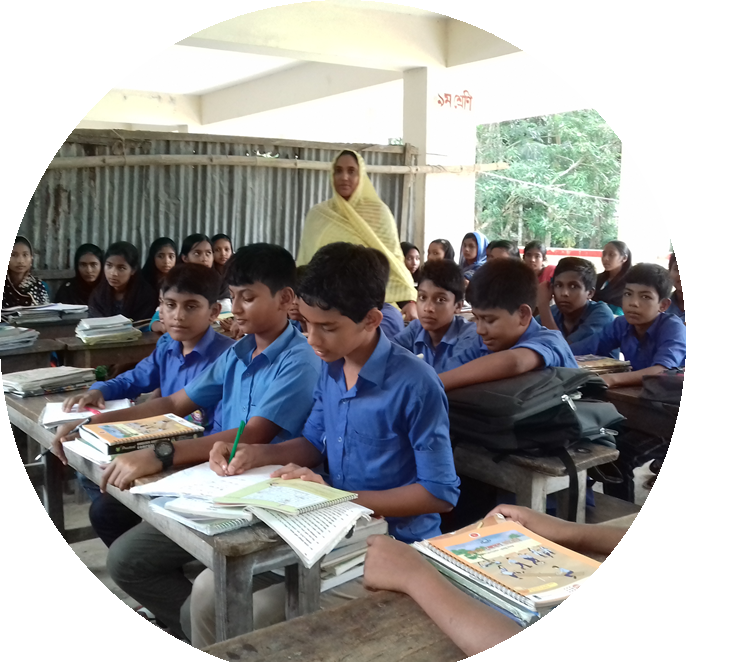Awareness on Adolescent Sexual Reproductive Health Rights (ASRHR) among Teachers of Secondary Institutions in disaster prone area of Bangladesh
Shahin, ASM; Asad, A; Baki, IJ and Khandaker
Plan International Bangladesh
Corresponding Author: Dr. Abu Syem Md Shahin – Health Program Specialist, House 14, Road 35, Gulshan – 2, Dhaka-1212, Bangladesh; Email: abu.shahin@plan-international.org
Introduction
There are 29.5 million adolescents in Bangladesh and they face a number of issues, including high rates of early marriage, high fertility rates, limited negotiation skills, and insufficient awareness of and information about reproductive health(RH) (Barkat, A., and Majid 2003). Poor RH knowledge is one of the factors that contributes to these problems. Although parents are the primary agents for socializing children, schools play an important role as secondary socialization agent (Fawole OI, Asuzu MC 1999). Teachers, therefore, occupy a central role in the lives of students for addressing RH challenges of in-school adolescents (Hammed MK, Adedigba M 2007). Plan International Bangladesh with partner organization Marie Stopes Bangladesh is implementing Adolescent Sexual Reproductive Health Rights (ASRHR) project at Patharghata, Barguna district to create an enabling environment at schools and madrassas for promoting ASRHR knowledge by increasing capacity of the teachers. The aim of this study was to find out the knowledge and skills of teachers on teaching ASRHR related issues.
Methodology
A cross-sectional survey was conducted in May, 2016 where quantitative data was collected using a structured questionnaire. 100 (60 School and 40 madrassas) teachers participated in this study from 30 secondary schools including madrassas. SPSS software was used to analyze data and descriptive statistics were used to describe the sample variables.
Results
Every teachers from school and madrassa were favorable regarding teaching ASRHR issues from the textbooks. However, regarding how the issues are taught, more than half of the teachers (59.0%) reported that it is taught ‘as a topic in a chapter’ and 28% teachers reported that the ASRHR issues are taught ‘as a chapter in a course’. About 41% teachers (36.7% school and 47.5% madrassa teachers) reported that dedicated teachers are assigned in their institutions to take classes on ASRH issues. However, 94.0% teachers reported about lack of IEC/BCC materials for teaching ASRH issues in their respective schools and madrassas and who were having these materials (6.0%) found it very helpful for teaching ASRH issues. More than two-thirds of the teachers (65.0%) know about incorporation of some new chapters on ASRH in the revised curriculum. About 71% teachers admitted that they face problems while taking classes. Regarding the problems faced, about 76.1 percent reported that they feel shy and one-third of them (29.6%) feels having lack of knowledge on managing students when they make fun of ASRHR issues in their classes. Therefore, they advised their students to study on ASRHR issues at home (83%) followed by discuss with parents (49%) or with others (42%). Only 45% of the teachers reported of formulating session plan for teaching on ASRHR issues.
Discussion
In this study, it is revealed that teachers were still ill equipped to handle the proposed ASRHR. They skipped some topics on RH due to shyness and less capacity to manage a class on a sensitive issue which was also found in others study(Alim, Nahar, and Khatoon 2012). It underscores the fact that teachers still need training in all aspects of ASRHR before they can effectively handle the subject-matter.
Conclusion
The conclusion from this baseline study is that teachers need training in all areas of ASRHR which will equip them in handling the subject-matter effectively in their respective schools and madrassas.
Reference
Alim, Abdul, Mst Ashrafun Nahar, and Fathema Zhura Khatoon. 2012. “How the Adolescents Applied Their Learning in Their Lives : An Evaluation of the Adolescent Development Programme of BRAC.” 32. Dhaka. http://research.brac.net/workingpapers/Working_Paper_32.pdf.
Barkat, A., and Majid, M. 2003. “Adolescent Reproductive Health in Bangladesh: Status, Policies, Programs and Issues.” http://www.policyproject.com/pubs/countryreports/arh_bangladesh.pdf.
Fawole OI, Asuzu MC, Oduntan SO. 1999. “Survey of Knowledge, Attitudes and Sexual Practices Relating to HIV infection/AIDS among Nigerian Secondary School Students.” African Journal of Reproductive Health 3 (2):15–24. https://doi.org/10.2307/3583357.
Hammed MK, Adedigba M, Ogunbodede OE. 2007. “No TitlThe Role of Secondary School Teachers in HIV Prevention in Nigeria.” Vulnerable Children and Youth Studies 2 (2):173–79.
Download the presentation, here.
To know more about the research contact:
Email: Ananya.Asad@plan-


Thanks for this important overview about how teachers approach their responsibility regarding providing information on SRHR to their students. It is clear to me that they need in particular to practice how to talk with their students about issues related to SRHR. They need to get specific training to feel comfortable during sessions with their students because otherwise they will reproduce the same feelings of shyness to their students. Special teaching materials produced for this type of lessons could be very helpful!!